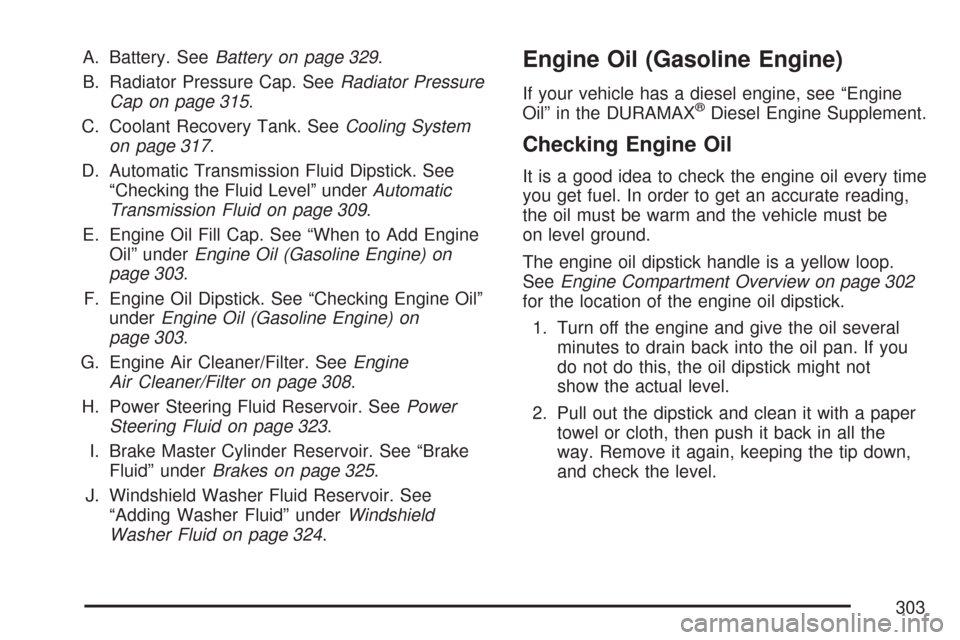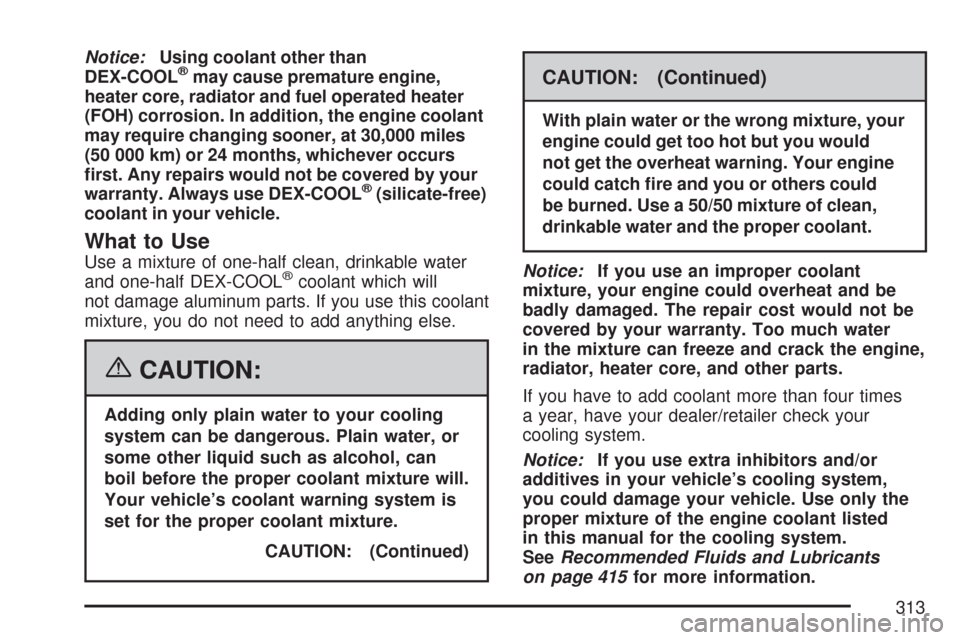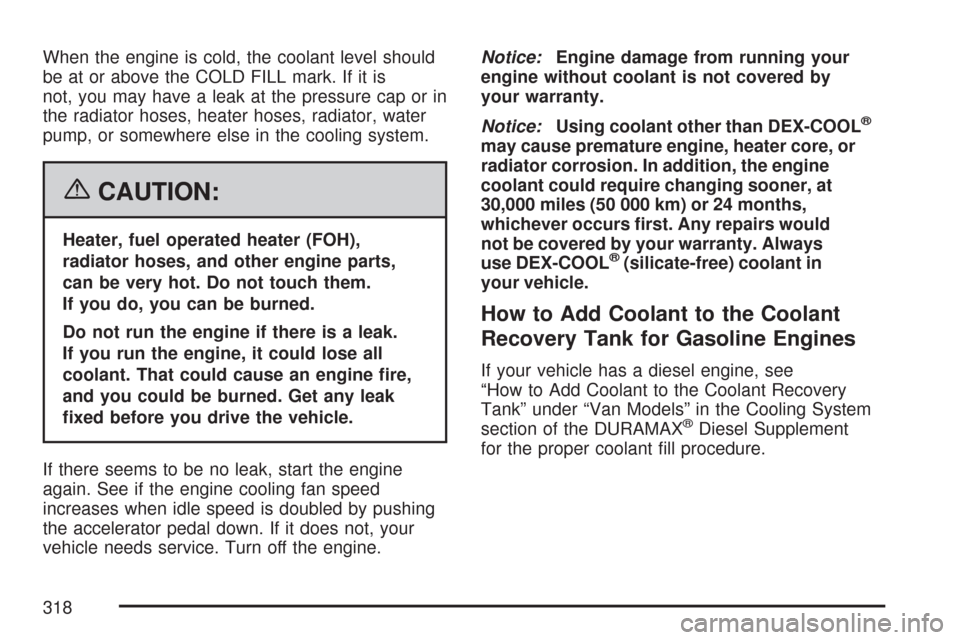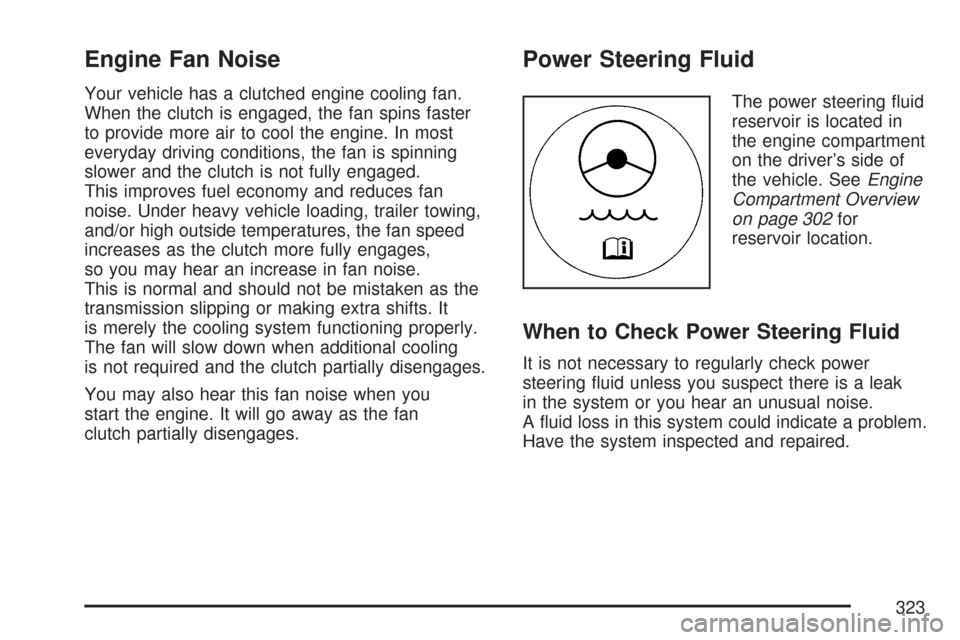Page 297 of 458
Filling the Tank
{CAUTION:
Fuel vapor burns violently and a fuel �re
can cause bad injuries. To help avoid
injuries to you and others, read and follow
all the instructions on the pump island.
Turn off your engine when you are
refueling. Do not smoke if you are near
fuel or refueling your vehicle. Do not use
cellular phones. Keep sparks, �ames, and
smoking materials away from fuel. Do not
leave the fuel pump unattended when
refueling your vehicle. This is against the
law in some places. Do not re-enter the
vehicle while pumping fuel. Keep children
away from the fuel pump; never let
children pump fuel.The tethered fuel cap is
located behind a hinged
fuel door on the driver
side of the vehicle.
If the vehicle has E85 fuel capability, a yellow cap
with the words “E85/gasoline” can be seen.
To remove the fuel cap, turn it slowly
counterclockwise.
While refueling, hang the tethered fuel cap from
the hook on the fuel door.
297
Page 298 of 458

{CAUTION:
Fuel can spray out on you if you open the
fuel cap too quickly. If you spill fuel and
then something ignites it, you could be
badly burned. This spray can happen if
your tank is nearly full, and is more likely
in hot weather. Open the fuel cap slowly
and wait for any hiss noise to stop.
Then unscrew the cap all the way.
Be careful not to spill fuel. Do not top off or overfill
the tank and wait a few seconds after you have
finished pumping before removing the nozzle.
Clean fuel from painted surfaces as soon
as possible. SeeWashing Your Vehicle on
page 386.
When replacing the fuel cap, turn it clockwise until
it clicks. Make sure the cap is fully installed.The diagnostic system can determine if the fuel
cap has been left off or improperly installed.
This would allow fuel to evaporate into the
atmosphere. SeeMalfunction Indicator Lamp
on page 178.
{CAUTION:
If a �re starts while you are refueling,
do not remove the nozzle. Shut off the
�ow of fuel by shutting off the pump
or by notifying the station attendant.
Leave the area immediately.
Notice:If you need a new fuel cap, be sure
to get the right type. Your dealer/retailer
can get one for you. If you get the wrong type,
it may not �t properly. This may cause your
malfunction indicator lamp to light and
may damage your fuel tank and emissions
system. SeeMalfunction Indicator Lamp
on page 178.
298
Page 299 of 458
Filling a Portable Fuel Container
{CAUTION:
Never �ll a portable fuel container while
it is in your vehicle. Static electricity
discharge from the container can ignite
the gasoline vapor. You can be badly
burned and your vehicle damaged if
this occurs. To help avoid injury to you
and others:
Dispense gasoline only into approved
containers.
Do not �ll a container while it is inside
a vehicle, in a vehicle’s trunk, pickup
bed, or on any surface other than the
ground.
CAUTION: (Continued)
CAUTION: (Continued)
Bring the �ll nozzle in contact with
the inside of the �ll opening before
operating the nozzle. Contact should
be maintained until the �lling is
complete.
Do not smoke while pumping
gasoline.
Do not use a cellular phone while
pumping gasoline.
299
Page 300 of 458
Checking Things
Under the Hood
{CAUTION:
Things that burn can get on hot engine or
fuel operated heater (FOH) parts and start a
�re. These include liquids like fuel, oil,
coolant, brake �uid, windshield washer and
other �uids, and plastic or rubber. You or
others could be burned. Be careful not to
drop or spill things that will burn onto a
hot engine or fuel operated heater (FOH).
Hood Release
To open the hood, do the following:
1. Pull the handle with
this symbol on it.
It is located in front
of the driver’s
side door frame
near the floor.
300
Page 303 of 458

A. Battery. SeeBattery on page 329.
B. Radiator Pressure Cap. SeeRadiator Pressure
Cap on page 315.
C. Coolant Recovery Tank. SeeCooling System
on page 317.
D. Automatic Transmission Fluid Dipstick. See
“Checking the Fluid Level” underAutomatic
Transmission Fluid on page 309.
E. Engine Oil Fill Cap. See “When to Add Engine
Oil” underEngine Oil (Gasoline Engine) on
page 303.
F. Engine Oil Dipstick. See “Checking Engine Oil”
underEngine Oil (Gasoline Engine) on
page 303.
G. Engine Air Cleaner/Filter. SeeEngine
Air Cleaner/Filter on page 308.
H. Power Steering Fluid Reservoir. SeePower
Steering Fluid on page 323.
I. Brake Master Cylinder Reservoir. See “Brake
Fluid” underBrakes on page 325.
J. Windshield Washer Fluid Reservoir. See
“Adding Washer Fluid” underWindshield
Washer Fluid on page 324.Engine Oil (Gasoline Engine)
If your vehicle has a diesel engine, see “Engine
Oil” in the DURAMAX®Diesel Engine Supplement.
Checking Engine Oil
It is a good idea to check the engine oil every time
you get fuel. In order to get an accurate reading,
the oil must be warm and the vehicle must be
on level ground.
The engine oil dipstick handle is a yellow loop.
SeeEngine Compartment Overview on page 302
for the location of the engine oil dipstick.
1. Turn off the engine and give the oil several
minutes to drain back into the oil pan. If you
do not do this, the oil dipstick might not
show the actual level.
2. Pull out the dipstick and clean it with a paper
towel or cloth, then push it back in all the
way. Remove it again, keeping the tip down,
and check the level.
303
Page 313 of 458

Notice:Using coolant other than
DEX-COOL®may cause premature engine,
heater core, radiator and fuel operated heater
(FOH) corrosion. In addition, the engine coolant
may require changing sooner, at 30,000 miles
(50 000 km) or 24 months, whichever occurs
�rst. Any repairs would not be covered by your
warranty. Always use DEX-COOL
®(silicate-free)
coolant in your vehicle.
What to Use
Use a mixture of one-half clean, drinkable water
and one-half DEX-COOL®coolant which will
not damage aluminum parts. If you use this coolant
mixture, you do not need to add anything else.
{CAUTION:
Adding only plain water to your cooling
system can be dangerous. Plain water, or
some other liquid such as alcohol, can
boil before the proper coolant mixture will.
Your vehicle’s coolant warning system is
set for the proper coolant mixture.
CAUTION: (Continued)
CAUTION: (Continued)
With plain water or the wrong mixture, your
engine could get too hot but you would
not get the overheat warning. Your engine
could catch �re and you or others could
be burned. Use a 50/50 mixture of clean,
drinkable water and the proper coolant.
Notice:If you use an improper coolant
mixture, your engine could overheat and be
badly damaged. The repair cost would not be
covered by your warranty. Too much water
in the mixture can freeze and crack the engine,
radiator, heater core, and other parts.
If you have to add coolant more than four times
a year, have your dealer/retailer check your
cooling system.
Notice:If you use extra inhibitors and/or
additives in your vehicle’s cooling system,
you could damage your vehicle. Use only the
proper mixture of the engine coolant listed
in this manual for the cooling system.
SeeRecommended Fluids and Lubricants
on page 415for more information.
313
Page 318 of 458

When the engine is cold, the coolant level should
be at or above the COLD FILL mark. If it is
not, you may have a leak at the pressure cap or in
the radiator hoses, heater hoses, radiator, water
pump, or somewhere else in the cooling system.
{CAUTION:
Heater, fuel operated heater (FOH),
radiator hoses, and other engine parts,
can be very hot. Do not touch them.
If you do, you can be burned.
Do not run the engine if there is a leak.
If you run the engine, it could lose all
coolant. That could cause an engine �re,
and you could be burned. Get any leak
�xed before you drive the vehicle.
If there seems to be no leak, start the engine
again. See if the engine cooling fan speed
increases when idle speed is doubled by pushing
the accelerator pedal down. If it does not, your
vehicle needs service. Turn off the engine.Notice:Engine damage from running your
engine without coolant is not covered by
your warranty.
Notice:Using coolant other than DEX-COOL
®
may cause premature engine, heater core, or
radiator corrosion. In addition, the engine
coolant could require changing sooner, at
30,000 miles (50 000 km) or 24 months,
whichever occurs �rst. Any repairs would
not be covered by your warranty. Always
use DEX-COOL
®(silicate-free) coolant in
your vehicle.
How to Add Coolant to the Coolant
Recovery Tank for Gasoline Engines
If your vehicle has a diesel engine, see
“How to Add Coolant to the Coolant Recovery
Tank” under “Van Models” in the Cooling System
section of the DURAMAX
®Diesel Supplement
for the proper coolant fill procedure.
318
Page 323 of 458

Engine Fan Noise
Your vehicle has a clutched engine cooling fan.
When the clutch is engaged, the fan spins faster
to provide more air to cool the engine. In most
everyday driving conditions, the fan is spinning
slower and the clutch is not fully engaged.
This improves fuel economy and reduces fan
noise. Under heavy vehicle loading, trailer towing,
and/or high outside temperatures, the fan speed
increases as the clutch more fully engages,
so you may hear an increase in fan noise.
This is normal and should not be mistaken as the
transmission slipping or making extra shifts. It
is merely the cooling system functioning properly.
The fan will slow down when additional cooling
is not required and the clutch partially disengages.
You may also hear this fan noise when you
start the engine. It will go away as the fan
clutch partially disengages.
Power Steering Fluid
The power steering fluid
reservoir is located in
the engine compartment
on the driver’s side of
the vehicle. SeeEngine
Compartment Overview
on page 302for
reservoir location.
When to Check Power Steering Fluid
It is not necessary to regularly check power
steering fluid unless you suspect there is a leak
in the system or you hear an unusual noise.
A fluid loss in this system could indicate a problem.
Have the system inspected and repaired.
323